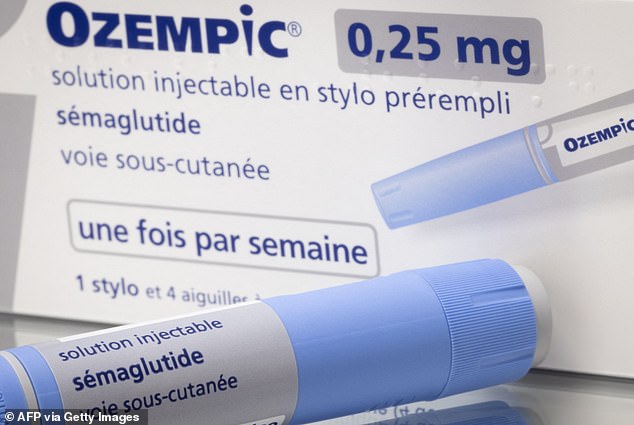Demand for Ozempic and Wegovy will soar in New Year - as people keen to lose weight say they'll enjoy one final festive feast before starting obesity drugs
- People taking the weight-loss drugs have revealed their festive eating plans
- READ MORE: What actually happens when you quit Ozempic: New study sheds light
Tis the season to make merry, indulge in seasonal boozing and ditch the diet on Christmas Day in favour of a slap-up turkey lunch - and then go on a diet come January 1st.
The rise of Ozempic, Mounjaro and Wegovy into the mainstream in recent months means that the traditional post-Christmas purge might look a little different for many people this year.
As the most lucrative day in the diet industry looms, sales of such anti-obesity drugs are predicted to soar in the New Year - as those who've wanted one final festive blow-out decide to begin their weight-loss jab journey in earnest.
A prescription for Wegovy in the UK is roughly the same price as an expensive gym's membership fees - from around £160 a month.
Famous users in the public eye such as Robbie Williams, Sharon Osbourne and Oprah Winfrey - who've all shown off dramatic results - has fuelled even more interest.
On X this week, one person frustrated with their weight said the new year would mark a new beginning, writing: 'After the holidays, I’m buying Ozempic. Enough is enough.'

Dry Jab-uary? Semiglutide weight-loss drugs such Ozempic and Wegovy went mainstream in 2024 - and January 2025 could see the anti-obesity drug manufacturers get a huge spike in sales


New Year's resolution could give the weight-loss drug industry a shot in the arm, as people decide to pay for drugs such as Wegovy and Ozempic after a Christmas food and booze blow-out


High profile names such as Robbie Williams, left, and Sharon Osbourne, right, have been candid about their use of weight-loss drugs
And what about those who already taking the semaglutide weight-loss drugs?
They're likely to spend Christmas Day with a drastically reduced appetite - one person on a self-support Facebook group suggested the thought of a turkey dinner with all the trimmings made them 'gag'.
And should you feel like eating, the other scenario is trying to drown out the 'food noise' - otherwise known as temptation that is everywhere in the festive season.
An average British Christmas dinner comes in at around 5,000 calories, if you include a starter, main and traditional pudding.
Add in nibbles, chocolates and more alcoholic drinks and it's estimated to be more like 7,000.
The NHS currently recommends that men consume 2,500 calories a day, while women should take in 2,000 calories per day.

Blow-out? Those who are already taking the drug have mixed feelings about whether to take a break over the Christmas period to enjoy seasonal indulgence




One person on a weight-loss drug revealed they'd already fallen off the wagon, thanks to Thanksgiving, saying: 'I can't have turkey and stuffing in the house. I gained 5lbs exactly, from yesterday morning to this morning. And I really want to have more turkey and stuffing.'
Another added: 'I’m so worried about Christmas - I might take a week break over Christmas to enjoy it lol.'
One agreed, saying: 'I want to be able to eat happily and drink with family rather than feel ill all the time.'
One woman said they would press pause on shedding the pounds - because they currently couldn't face the prospect of a usual festive lunch.
They wrote: 'The thought of a Christmas dinner is making me gag already. I just think you also need to live your life … I’m taking a week off and then I’ll be ready and excited to go again.'
However, for others, Christmas Day is perhaps the biggest test of the year - and they're determined not to take a break from the drugs they're on.
One person wrote: 'I’m excited to not over eat this Christmas. I’ll have a little bit of everything and will be pleased.'

GLP-1 drugs such as Ozemic were initially designed as a treatment for diabetes - but sales have soared amongst those who simply just want to shed excess pounds
Another said they were 100 per cent committed to their weight-loss journey.
'I'm in this 10 toes down. Sometimes we have to ask ourselves what is more important. '
Others agreed, saying: 'I'm sticking too it over Christmas as my losses are why I started.
One person made a passionate declaration that they would keep to their regime, saying: 'I'm sticking to it. I don't care about food and drinking in order to have fun and enjoy my family.
'Yeah it adds to the joy of the season but with this is a lifestyle change and I want to be 100% on board. Old habits must die hard! My life should not revolve around food anymore!'
Wegovy and Ozempic are known as GLP-1 receptor agonists and lead to weight loss by mimicking the actions of GLP-1, a hormone in the brain that regulates appetite and feelings of fullness.
Research shows that patients who stop taking semaglutide – the active ingredient in Ozempic and Wegovy – on average regain about two-thirds of their weight.
However, patients who lose a large amount of weight in a short period of time are far more likely to regain it compared to those who only slightly slimmed down on the medicine.
Experts say that this may be due to a phenomenon known as the set point theory, the idea that the body has a natural weight range, or set point, that it is always working to maintain.
This weight varies from person-to-person, and experts argue it explains why some people are naturally thin, while others are larger.
'One of the biggest factors that can predict how you will fare once coming off these drugs is how quickly you lost the weight to begin with,' says Dr Nerys Astbury, a diet and obesity expert at the University of Oxford.
'This might be due to the fact that the body has a weight it's trying to get back to, and it's much heavier than what you are when you stop the injections.'
Another theory is that patients who lose their excess weight quickly are more likely to return to unhealthy eating habits.
'If you experience rapid weight loss and then immediately come of the drugs, then it's unlikely you will have developed new healthy eating habits,' says Dr Astbury. 'Instead you might return to excessive eating, reversing the progress made.'
Regardless of the cause, experts agree that those who come off GLP-1 drugs and immediately put weight back on tend to have one thing in common: They do not exercise.
'It's clear that people who regularly do physical activity maintain weight loss much better than those who do not,' says Dr Astbury. 'So some exercise is better than none.'




































































































































































































































































































































































